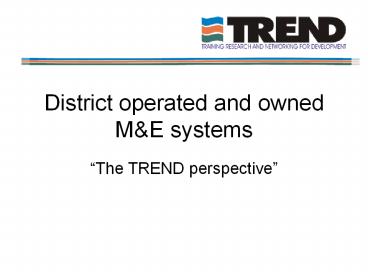District operated and owned M - PowerPoint PPT Presentation
1 / 15
Title:
District operated and owned M
Description:
... level stakeholders in Monitoring for Effectiveness in Volta region in 2000 ... Comparing MOM situation (Volta) with non MOM situation (Brong Ahafo) ... – PowerPoint PPT presentation
Number of Views:37
Avg rating:3.0/5.0
Title: District operated and owned M
1
District operated and owned ME systems
- The TREND perspective
2
Where we are coming from
- TREND as a learning organisation
- TREND has collaboration with national and
international partners in the area of knowledge
management - TREND has the objective to document and share
best practices with all levels of stakeholders
3
Experience with ME
- Collaboration with IRC in training of district
and regional level stakeholders in Monitoring for
Effectiveness in Volta region in 2000 - Currently involved in
- Discussions regarding structuring Monitoring
Operation and Maintenance (MOM) system CWSA,
Greater Accra - Post Construction Support study
- Position paper on monitoring the MDGs -gt
disseminated through workshop
4
Effectiveness and efficiency
Results use of outputs
Monitoring for effectiveness
Immediate objective
Outputs
Monitoring for Efficiency
Target
Inputs
5
ME clients and information transmission network
International level (donors, UN bodies, etc.)
Resource allocation Advocacy Policy formulation
National level (Agencies, donors, UN bodies,
etc.)
Action planning Resource allocation
Region
Action planning Resource allocation
District
Corrective measure
Community
6
Post Construction Support study
- Relationship between post construction support
and sustainability - Monitoring as a form of post construction support
- Added value of MOM to sustainability?
- Comparing MOM situation (Volta) with non MOM
situation (Brong Ahafo)
7
Lessons learnt so far from PCS
- Sustainability depends on many factors
- these should be taken up in monitoring systems
- Data is extracted from the community to feed
district and regional MIS. - Communities do not recognise value of monitoring
exercise
8
MOM in Greater Accra
- Monitoring information is generated at community
level, by the community gt Monitoring is owned by
the community - Monitoring information is continuously used to
solve problems at community level - Information flows periodically from the community
to the district and regional levels
9
Qualitative Information Systems
- Qualitative Information Systems (QIS) a system
to quantify peoples perceptions - for the effective and efficient planning of new
services and for the monitoring of existing ones,
- at both community and district levels.
10
QIS consists of
- Qualitative Information Appraisal comprising of
a - Quantified Participatory Assessment (QPA) at
community level, - multi stakeholder meetings to discuss QPA
findings, - identify corrective actions for an Action
Planning Report - Village information system to enable communities
to - store information,
- monitor progress
- plan corrective actions
- Adaptive management
- to trigger speedy and appropriate responses from
management and communities to implementation
problems. - Computerised database at district / regional
level to - store information,
- facilitate repeated data collection and analysis,
- streamline data collection needs
11
TRENDs perspective
- People who have a stake and vested interest in
the issues, will be most motivated to monitor - Actively involve users and beneficiaries of
monitoring information in - identifying indicators
- Collecting, analysing and storing monitoring
information - Monitoring information should be collected and
acted upon at the lowest possible level - Pilot ME system on small scale and scale it up
- Capacity building of stakeholders
12
Challenges ahead
- Key issues identified during workshop on
Improving the quality and utilisation of MDG
monitoring data at national and sub-national
level - Framework for monitoring
- Coordination
- Capacity
- Civil Society Involvement
- Definitions and Indicators
- Collection Method/Data Sustainability beyond
coverage - Desegregation /Breakdown of Data
13
Framework
- need for the establishment of a central
institution to - provide a forum for harmonization and validation
of the data - Act as one stop centre for collecting information
on the sector. - better stakeholder coordination
- civil society has an important role to play
(providing feedback from monitoring information,
capacity building, technical support, etc.)
14
Data and data collection
- go beyond just monitoring coverage or
implementation data. - Include sustainability aspects such as
- functionality of systems
- water quality
- water use
- functioning of watsan committees
- data collection instruments designed in order to
allow for disaggregation (by geological area and
social economic status).
15
Thank you

